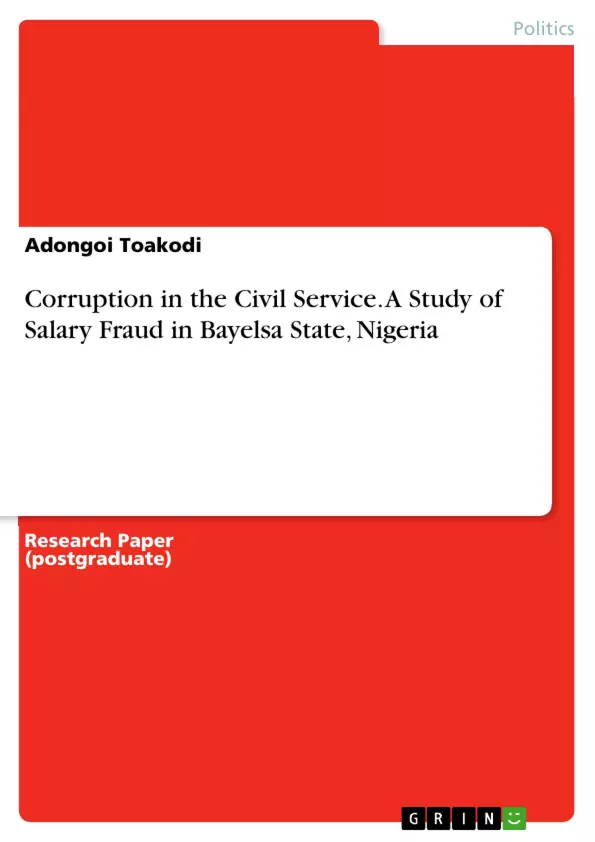This study investigates factors responsible for salary fraud in Bayelsa State Civil Service, Nigeria. The study adopted ex-post-facto research design. Data were gathered from secondary sources. Robert K. Merton’s anomie theory was adopted as the study’s theoretical framework. The study found that the crime of salary fraud persists in Bayelsa State civil service despite measures taken by government to stem it. It also discovered that the challenges such as lack of adequate funds and corruption confronting the Economic and Financial Crime Commission (EFCC) are responsible for the futile prosecution of culprits. Based on these discoveries, the study recommends amongst others, that Bayelsa State Government should train Forensic accountants to man all her Ministries, Departments, and Agencies as a proactive measure to check fraud.
Table of Contents
- ABSTRACT
- Introduction
- Statement of the Problem
- Objectives of the Study
- Significance of the Study
- Review of Related Literature and Theoretical Framework
- Factors that Contribute to Salary Fraud in Bayelsa State Civil Service
- The Role of Economic and Financial Crime Commission (EFCC) in Prosecution of Culprits
- Theoretical Framework
- Methodology
- DATA PRESENTATION
- Discussion of Findings
- Conclusion
- Recommendations
- REFERENCES
Objectives and Key Themes
This study aims to examine the factors contributing to salary fraud within the Bayelsa State Civil Service in Nigeria. The research adopts a specific theoretical framework and seeks to identify the role of the Economic and Financial Crime Commission (EFCC) in prosecuting perpetrators of this crime. Additionally, it seeks to understand the impact of salary fraud on the state's capacity for development and address the persistent nature of this issue despite attempts to address it.
- Factors contributing to salary fraud in the Bayelsa State Civil Service
- The role of the EFCC in prosecuting salary fraud perpetrators
- The impact of salary fraud on socio-economic development in Bayelsa State
- The effectiveness of existing measures to curb salary fraud
- Recommendations for addressing the problem of salary fraud
Chapter Summaries
The introduction highlights the prevalence of salary fraud in the Bayelsa State Civil Service, noting its impact on government expenditure and the state's capacity for development. It details the methods used by civil servants to perpetrate fraud, particularly the inclusion of "ghost workers" in the payroll. The introduction also references previous efforts to address the issue and their limited success.
The "Statement of the Problem" chapter outlines the specific concerns related to salary fraud in Bayelsa State. This includes the increase in the state's wage bill without a corresponding increase in the workforce, the discovery of fraudulent activities in the payroll, and the lack of prosecution of perpetrators. It also raises questions about the awareness and inaction of anti-graft agencies. The chapter concludes by highlighting the need for further investigation and efforts to address this issue.
The "Objectives of the Study" chapter clarifies the specific goals of the research, focusing on identifying factors contributing to salary fraud, evaluating the role of the EFCC in prosecution, and examining the impact of salary fraud on the state's development. It also aims to suggest effective strategies to combat this crime.
The "Significance of the Study" chapter discusses the importance of this research in addressing the problem of salary fraud within the Bayelsa State Civil Service. It highlights the need for a comprehensive understanding of the issue, including its causes, consequences, and effective solutions. This study aims to contribute to the ongoing efforts to combat corruption and improve the functioning of the civil service in Bayelsa State.
The chapter "Review of Related Literature and Theoretical Framework" explores previous research on corruption and financial crimes in Nigeria, highlighting the scarcity of studies specifically focusing on salary fraud. It also introduces the theoretical framework adopted for this study: Robert K. Merton's anomie theory. This chapter further examines the factors contributing to salary fraud in Bayelsa State Civil Service, including the lack of adequate funds, the role of syndicates within the system, and the challenges faced by anti-graft agencies in prosecuting culprits. It then analyzes the role of the Economic and Financial Crime Commission (EFCC) in combating salary fraud, discussing the limitations and challenges encountered by this agency.
Keywords
The key themes and concepts explored in this study include salary fraud, corruption, civil service, Bayelsa State, Nigeria, Economic and Financial Crime Commission (EFCC), anomie theory, socio-economic development, ghost workers, and forensic accounting. The study focuses on understanding the factors contributing to salary fraud, the role of anti-graft agencies in combating it, and the impact of this crime on the state's development.
Frequently Asked Questions
What is the primary cause of salary fraud in Bayelsa State?
The study identifies systemic corruption, lack of adequate funding for oversight, and the presence of fraudulent syndicates as primary causes.
What are "ghost workers" in the context of civil service?
"Ghost workers" are non-existent employees included in the payroll by corrupt officials to siphon government funds through fraudulent salary payments.
Which theoretical framework is used in this study?
The research adopts Robert K. Merton’s anomie theory to explain the socio-economic pressures that lead to fraudulent behavior.
Why has the EFCC struggled to prosecute culprits?
Challenges include a lack of adequate funds, internal corruption within the commission, and the complex nature of payroll syndicates.
What is the main recommendation of the study?
The study recommends training and deploying forensic accountants to all government ministries and agencies as a proactive measure to detect and prevent fraud.
- Quote paper
- Dr. Adongoi Toakodi (Author), 2014, Corruption in the Civil Service. A Study of Salary Fraud in Bayelsa State, Nigeria, Munich, GRIN Verlag, https://www.grin.com/document/441900



